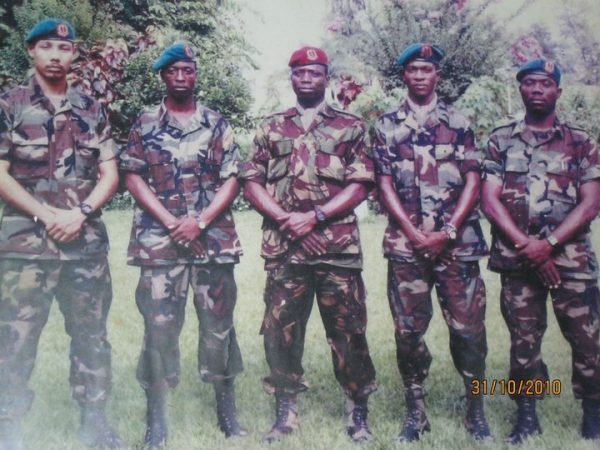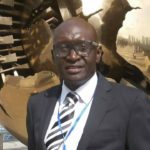
In my last paper I started by shedding light on my activities as a military staff officer at the time of the July 22nd military takeover. I briefly discussed my general duties in that office and the specific task during that period of coordinating the organised war games by the Gambia National Army (GNA) and a mechanized-American-marine-combat platoon.
But for the need to scrutinise certain vague issues about our experience at Mile Two Prisons presented by Captain Ebrima Cambi to the TRRC without the germane questions asked by the counsel to validate their authenticity and that of previous witnesses’ I thought it imperative to share my version of what I believe actually transpired for fairer judgment without prejudice. In fact, I still have to exhaust that narrative before starting on the subject of the July 22nd 1994 coup d’etat.
Apparently the captain and I did interact in the first days of the coup before my arrest and detention; but somehow he seemed to have forgotten everything about that. There is no need to revisit the implications.
Notwithstanding, one important revelation worth appreciating in Cambi’s statement was his invalidation of the argument by Mamat Cham that he coined the AFPRC name when he said that it was indeed Edward Singhateh. I thought the Counsel should have asked Mr Cambi what he felt about Captain Mamat Cham’s claim to own that initiative.
That said, the captain literally cried when narrating his experience in Liberia and the way they were abused as Gambian soldiers sent to fight and die on a government sanctioned mission but denied their national and human rights to be repatriated for burial when killed in action.
After almost being killed in the battlefield with sustained injuries requiring special attention he had to take extreme measures to force his way back home for his treatment. Now fancy how the ordinary helpless soldiers had felt throughout after their two comrades – Cpl. Lamin Bojang and Private Sama Jawo – became the first victims killed and abandoned in Liberia and recognising the gloomy fact that a similar fate awaited all of them if killed there? There was in fact another senior officer who was accused of resorting to fake an illness in the heat of the battle and defiantly demanded to be evacuated to The Gambia for treatment. He was as a result dismissed from the army. I couldn’t blame him at all. The government built an army that it had no respect for whatsoever.
I think Hon. Omar Amadou Jallow’s (OJ) characterization of African soldiers at the TRRC as mere undereducated outcasts, envious to the successful citizenry explained a lot about why the PPP government never treated us like humans endowed with rights and dignity. For not being heard as a minister at that time condemning the decision not to allow burying our dead soldiers in The Gambia meant he, of course, condoned it wholeheartedly.
O.J. talking as if his mind was disconnected from his voice castigated the African soldiers and the African Intellectuals for contributing to the destruction of the continent and turned around right there to venerate the Senegalese Armed Forces as if that country is not part of the African continent.
What he means by the African intellectuals is opened to anyone’s interpretation but by arguing that a Senegalese military or gendarmerie captain cannot achieve certain ranks without earning a college degree followed or backed by robust intellectual training denotes he meant “college-educated people”.
So if O.J’s voice was connected to his brain I think he would have heard himself saying that he hated the African soldiers for their intellectual deficiency and unprofessionalism but loved the Senegalese soldiers for their intellectual efficiency and professionalism. Yet in his view of an ideal Africa with perhaps the exception of Senegal, there shouldn’t be any soldiers or intellectuals.
He mesmerised members of the commission when decrying the departure of the Senegalese Confederation Forces from The Gambia and the invitation of Nigerian soldiers to assume command and control of the GNA.
The ex-minister is fond of asking why Gambians especially those in positions of authority didn’t do anything about certain events or incidents deemed wrong and unacceptable. Suggesting necessary resignation if everything failed.
I know for sure that he never took any significant action to reverse the sinful decision of the “perfect” PPP government to deny Gambian soldiers killed in Liberia their right to be buried home. He said or did nothing about the departure of the Senegalese forces that he said should have never happened. I can bet that he never protested to President Jawara about having Nigerian soldiers to head the GNA, Nigerian soldiers who were “coup mongers, uneducated, envious” like the average African soldier. He probably would say he did take some action but not significant enough. Then what happened to resigning as a last resort if nothing worked as he would recommend?
By the way, blaming the army’s ineptitude on poor educational background measured by our lack of college degrees or not being intellectual enough (although he can’t stand intellectuals), one wonders how well educated the PPP executive was or how many of them had college degrees to qualify them as our best governors? For one to introduce one’s profession or career as politician tells little about one’s educational background in The Gambia. The PPP government at some point didn’t only offer ministerial position to undereducated underachievers but had a few who had never even been to school.
I must write to O.J. about what soldiering meant in the GNA, a typical African Army. No, we were not as bad as portrayed. Let it be known that this mad soldier will not remain quiet about it. I am glad that he chose to forgive and forget. He certainly didn’t deserve the punishment he endured. Back to my topic!
After I was released from jail while Captain Cambi was still detained, he probably may or may not have heard that I immediately went to Liberia on a special mission to recover the remains of his two soldiers – Lance Corporal Lamin Bojang and Private Sama Jawo. Both were brought back home and given a fitting state burial in Banjul with their family members present and treated with honour and dignity. Most Gambian officers knew about that but will perhaps make me look too sane if they were to acknowledge it at the TRRC.
In Jail, I tried everything to beat the system for our common good. Captain Cambi mentioned a very good prison officer at our disposal, running errands for us for the right price. I used to pay him cash for all hot and classified information and whenever to deliver the notes I was taking on toilet papers to my wife. He would bring me money from my wife, local newspapers, food, and even an FM/AM band hand radio with headphones. I would write to the BBC and the Daily Observer Newspaper adopting the pen name Ebou Colley and sending positive messages about the detainees and how they did not belong to Mile Two Prison.
One day Mr Alagie Kanteh informed me about a protest visit of the US ambassador to the State House before his arrest and detention. He was then the spokesman of the AFPRC government. Mr Winters wanted an explanation on a statement made by Chairman Jammeh in Dakar Senegal when asked by journalist about what happened to us and he said that Captain Mamat Cham and I were arrested because of our rogue activities with a foreign power to undermine the coup, a foreign power that fitted the description of the U.S government. Jammeh, according to Mr Kanteh assured the ambassador that he didn’t necessarily mean America.
With that story, I gave our courier a letter for Ambassador Winters through my wife, detailing the circumstances surrounding my arrest and detention. I will later explain those details although everything is in my book.
My wife handed over the letter to Mr James Knight which I believe eventually motivated the political adviser and his ambassador Mr Andrew Winters to successfully arrange a brief visit to see us at Confinement Number 4. It was really reassuring and highly appreciated. Before leaving, we asked them to help us with books to read. Surprisingly, they sent us a lot of books few days later, delivered by P.O. Thomas Jarju.
We had had a close judicious team sharing ideas on what to write about to the BBC and the Daily Observer Newspaper. We read about Ebou Colley’s publications smuggled in by our courier.
In 2000, after leaving the country on self-exile to the USA, I started writing all my experiences about the coup in the “Gambia-L” using the same pen name Ebou Colley. It was more or less what I am writing about today with the whole details found in my book.
I had to stop sending letters to the BBC and the local newspapers after an embarrassing failure to convince my fellow married detainees to mobilise our wives to go and present an appeal petition to the AFPRC junta for our possible pardon and release. After initially agreeing to the suggestion, my colleagues later decided not to put their wives to the task, contending that they had committed no crime for their detention and didn’t know what I did after being appointed minister to warrant my arrest and detention. It was more or less telling me that I could have committed a crime that justified my arrest but they possibly couldn’t have. Barely a month and half later I went home free after attending the mandatory “Detainees’ Review Board Commission” formed by the junta to determine our innocence or guilt. You may know the rest of the story. If not, read my book.
Shifting the script to the testimony of Dr Minteh, I still find it hard to believe that I was listening to a sober doctorate degree holder delivering that kind of presentation. It was disgraceful to say the least. He either was coached into saying what he said or had a co-author to write part of his statement that he never bothered to familiarise himself with.
I will however wait for him to finish his testimony before breaking down his inconsistencies and contradictions. What he said so far barely tallied with the version of his immediate commander and was far apart from his ground commander’s while his principal witnesses are all dead, reminding me of another shameless con-artist whose witnesses all passed away.
I was in the middle of the chaos at the Denton Bridge that day and can name every officer there; but so far only Captain Suwareh remembered my presence.
Dr Minteh couldn’t remember the presence of Captain Momodou Sonko either. By seniority, I had encountered all the following there: D.I.G Chongan, Captain Momodou Sonko, Captain Amadou Suwareh, Lieutenant Yahya Jammeh, Senior Police Officer Pa Mbye and of course the Dr – (then) Lieutenant Binneh Minteh.
I think it is about time the TRRC tried finding the real facts from the NCOs and private soldiers on the hot spots that day especially at the Denton Bridge where one inconsistent story teller succeeds the other all to garner cheap fame or god knows what.
To be continued.
By Samsudeen Sarr











Recent Comments